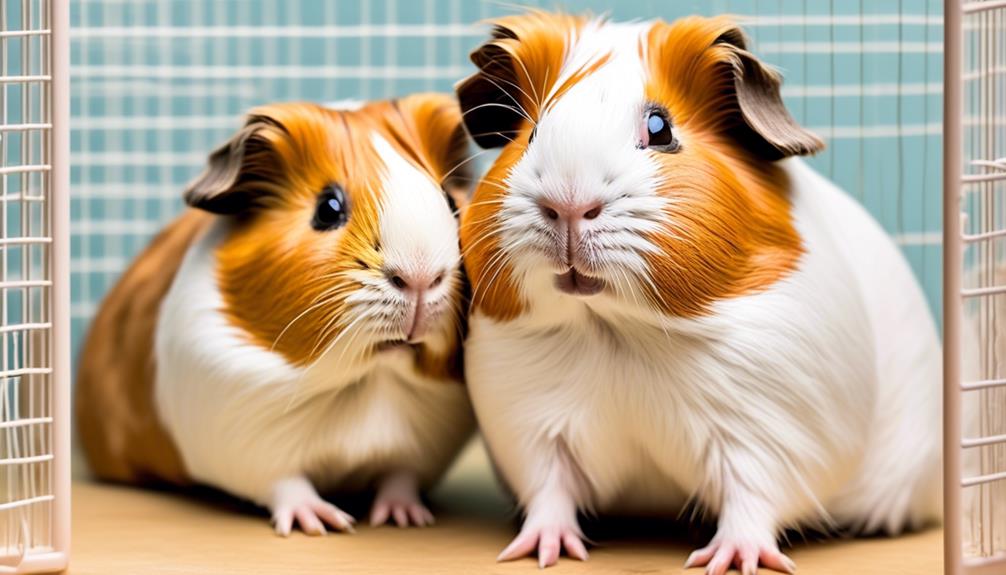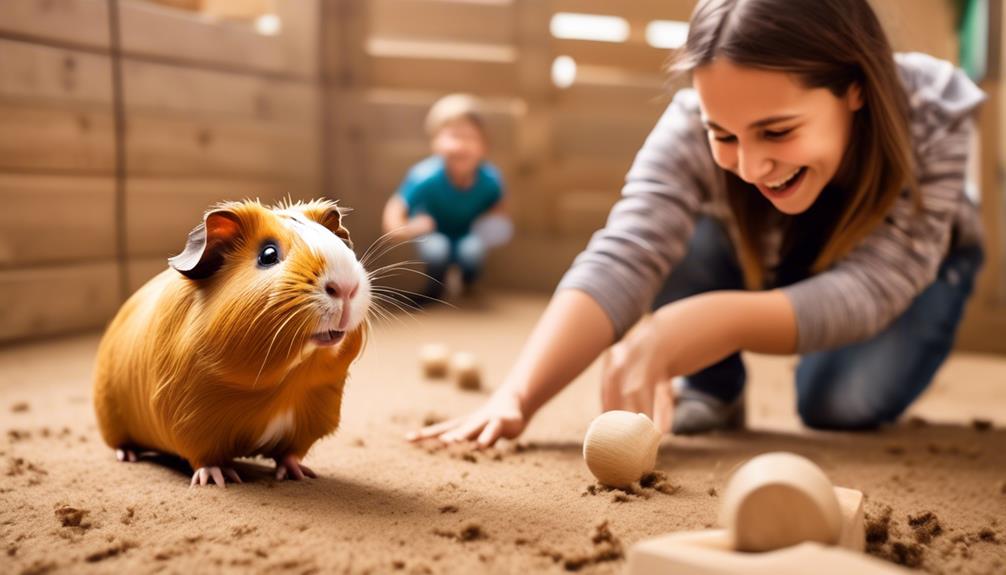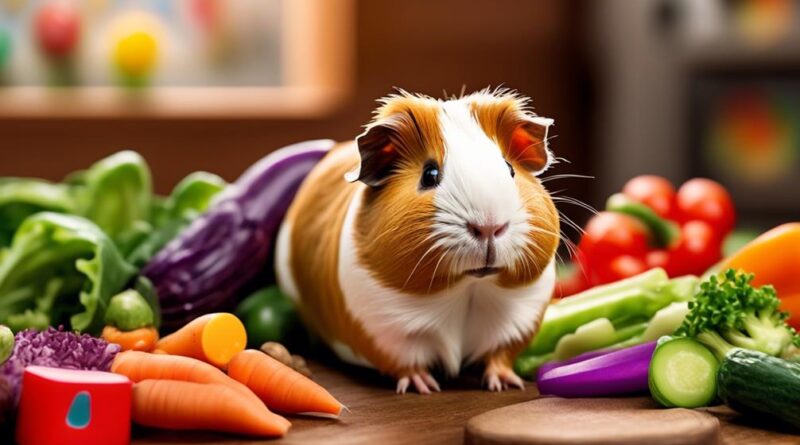Four Essential Tips for Obedient Guinea Pigs
You may not realize that guinea pigs are highly intelligent and capable of learning a variety of commands and behaviors. If you want to ensure that your guinea pig is well-behaved and obedient, there are four essential tips you need to know.
By implementing these strategies, you can build a strong bond with your guinea pig and establish a harmonious relationship based on trust and cooperation.
These tips will not only enhance your pet's obedience but also contribute to their overall well-being and happiness.
Are you ready to unlock the secrets to having a well-behaved and responsive guinea pig?
Understanding Guinea Pig Behavior

To understand guinea pig behavior, observe their interactions with each other and their environment. Guinea pigs communicate through body language, which is crucial for understanding their social hierarchy. Pay attention to their movements, sounds, and posture. For instance, if a guinea pig raises its head and stands tall, it's a sign of dominance. On the other hand, a submissive guinea pig may cower or make itself appear smaller. Understanding these cues will help you create a harmonious environment for your pets.
Guinea pigs establish a social hierarchy within their group. This hierarchy determines the order of dominance and submission among them. You may notice them displaying dominant behaviors, such as chasing, mounting, or even teeth chattering. It's essential to recognize these behaviors to ensure that there's no aggression or bullying within the group. Providing enough space, hiding spots, and separate feeding areas can help minimize conflicts among guinea pigs.
In addition to observing their interactions, spend time interacting with your guinea pigs. This will help you understand their individual personalities and preferences. Pay attention to how they respond to your presence and handling. Building a strong bond with your guinea pigs will make it easier for you to recognize any changes in their behavior, indicating potential health issues or stress.
Establishing Trust and Bonding
Start by spending quality time with your guinea pigs every day to build trust and strengthen your bond with them. Building trust is crucial for a strong and healthy relationship with your guinea pigs. One effective way to build trust is through gentle and consistent interactions. Approach your guinea pigs calmly and speak to them softly to help them feel secure in your presence. Sit near their enclosure and offer them treats, such as small pieces of vegetables or fruits, to associate your presence with positive experiences.
Forming connections with your guinea pigs can be further enhanced through bonding exercises. Gently petting them and allowing them to explore your scent can help them become more familiar with you. Additionally, engaging in interactive play sessions, such as using toys or creating obstacle courses for them to navigate, can strengthen the bond between you and your guinea pigs.
Trust building techniques can also involve hand-feeding your guinea pigs to associate your hand with food and care. This can help them feel more comfortable with you and reduce any fear or anxiety they may have. Furthermore, spending time talking to your guinea pigs in a soothing tone can help them recognize your voice and feel reassured in your presence.
Positive Reinforcement Training Techniques
As you continue bonding with your guinea pigs, incorporating positive reinforcement training techniques can further strengthen your relationship and enhance their obedience.
Reward based training is a powerful tool for shaping your guinea pig's behavior. When your guinea pig performs a desired action, such as coming when called or using a litter box, immediately reward them with a small treat. This positive association reinforces the behavior and encourages them to repeat it in the future.
Clicker training techniques can also be highly effective. By using a clicker, you can mark the exact moment your guinea pig performs the desired behavior, followed by a treat. This helps your guinea pig understand exactly what they did to earn the reward, making the training process clearer and more efficient.
Consistency is key when using positive reinforcement. Always reward your guinea pig for the behavior you want to encourage and ignore unwanted behavior whenever possible. By consistently rewarding the desired actions, your guinea pig will quickly learn what's expected of them.
Positive reinforcement training techniques not only improve obedience but also create a positive and enjoyable training experience for both you and your guinea pigs.
Basic Commands and Training Tools
You can teach your guinea pigs basic commands and utilize various training tools to enhance their obedience and mental stimulation. Understanding clicker training can be a valuable tool in teaching your guinea pigs basic commands. Clicker training involves using a small handheld device that makes a clicking sound to mark a desired behavior, followed by a treat as a reward. This method helps your guinea pigs associate the sound of the clicker with a positive outcome, making it an effective way to communicate and reinforce their training.
Using target training is another effective method for teaching your guinea pigs basic commands. This involves using a target stick, which can be a simple wooden stick with a colorful ball attached to the end. By presenting the target stick to your guinea pig and rewarding them with a treat when they touch the ball with their nose or follow the stick, you can effectively train them to follow commands such as 'come,' 'stay,' or 'go to a specific location.'
In addition to these training tools, it's important to use positive reinforcement, such as verbal praise and healthy treats, to encourage and reward your guinea pigs for following commands. Consistency and patience are key when training your guinea pigs, as it may take time for them to understand and respond to the commands.
With the right training tools and techniques, you can effectively teach your guinea pigs basic commands and enrich their lives through mental stimulation and positive interactions.
Handling Fear and Anxiety in Guinea Pigs
Guinea pigs can exhibit fear and anxiety, which may require gentle and patient handling to help them feel secure and comfortable in their environment. It's important to address their stress and anxiety to ensure their overall well-being. Here are some tips for handling fear and anxiety in your guinea pigs:
- Create a Calm Environment: Provide a quiet and peaceful space for your guinea pigs to reduce stress. Keep them away from loud noises and sudden movements. Consider placing a cozy hideout in their enclosure where they can retreat when they feel anxious.
- Gentle Interaction: When handling your guinea pigs, approach them calmly and speak softly. Use slow, deliberate movements to avoid startling them. Spend time sitting near their enclosure to help them get used to your presence before attempting to handle them.
- Calming Techniques: If your guinea pig seems anxious, you can try using calming techniques such as gentle petting and soothing words. Additionally, providing them with safe chew toys and activities can help reduce stress and anxiety.
Creating a Consistent Training Schedule
Consistently training your guinea pigs is essential for their development and well-being. Establishing a consistent routine for obedience training will help your guinea pigs understand what's expected of them and create a harmonious environment for both you and your pets.
When creating a training schedule, it's important to be consistent with the timing and duration of training sessions. Set aside specific times each day for training, and try to stick to the schedule as closely as possible. Guinea pigs, like many animals, thrive on routine and will respond better to training when it occurs at the same time each day.
Start by scheduling short training sessions, around 10-15 minutes, to prevent overwhelming your guinea pigs. Keep the training consistent by using the same commands and gestures each time. Consistency in your approach will help your guinea pigs understand what's expected of them, leading to better results.
Additionally, consistency in training will help build trust between you and your guinea pigs, as they'll come to understand that you're a reliable and consistent source of guidance and care.
Troubleshooting Common Training Challenges

When facing common training challenges with your guinea pigs, it's important to approach the situation with patience and understanding. Overcoming stubbornness and building motivation and enthusiasm are key aspects of troubleshooting these challenges. Here are some tips to help you navigate through common training obstacles:
- Positive Reinforcement: Utilize treats and verbal praise to motivate your guinea pig. When attempting to teach them a new behavior, reward them with their favorite treat immediately after they perform the desired action. This will help build their motivation and enthusiasm for the training process.
- Consistency: Consistency is crucial when working with guinea pigs. Ensure that the training methods, cues, and rewards remain consistent throughout the training process. This will help them understand what's expected of them and reduce any confusion that may lead to stubborn behavior.
- Patience and Understanding: Guinea pigs, like any other animal, have their own personalities and learning pace. It's important to be patient and understanding when they show signs of stubbornness. Avoid getting frustrated and instead, try to understand their perspective, adjust the training approach if needed, and provide encouragement to build their motivation.
Enrichment Activities for Mental Stimulation
As you troubleshoot common training challenges with your guinea pigs, incorporating enrichment activities for mental stimulation can further enhance their engagement and overall well-being. Guinea pig toys are a great way to provide mental exercise and problem-solving opportunities. Interactive feeding toys, such as puzzle feeders or treat balls, can stimulate your guinea pig's mind as they figure out how to access their food. These toys encourage natural foraging behaviors, keeping your pets mentally active and engaged.
In addition to toys, consider creating DIY enrichment activities. You can make simple hide-and-seek games by hiding treats or vegetables around their play area for them to find. This stimulates their problem-solving abilities and keeps them entertained. Creating tunnels and mazes using cardboard boxes or PVC pipes can also provide mental stimulation and serve as a fun, interactive playground for your guinea pigs.
Rotating and introducing new toys and activities regularly is crucial to prevent boredom and maintain mental engagement. Keep in mind that while guinea pigs are intelligent, they also have short attention spans, so changing up their environment is essential.
Frequently Asked Questions
How Do I Introduce a New Guinea Pig to an Established Group?
When introducing a new guinea pig to an established group, it's important to consider the group dynamics. Introducing new additions can disrupt social dynamics, so it's best to do so gradually.
Start by placing the new guinea pig in a separate but adjacent space for a few days, allowing them to get used to each other's presence.
Then, gradually introduce them under supervision to monitor their interactions and ensure a smooth integration.
What Are Some Common Health Concerns for Guinea Pigs and How Can They Impact Their Behavior and Training?
Common health concerns for guinea pigs, such as dental issues, respiratory problems, and vitamin C deficiency, can greatly impact their behavior and training. These health issues can cause pain or discomfort, leading to changes in behavior and making training more challenging.
It's important to be aware of these potential health concerns and their impact on behavior when training your guinea pig. Regular vet check-ups and a balanced diet can help prevent and address these issues.
Can Guinea Pigs Be Trained to Use a Litter Box?
Yes, guinea pigs can be trained to use a litter box. Training methods like positive reinforcement and clicker training can be effective.
Start by placing the litter box in a corner of their cage where they tend to go. When they use the litter box, reward them with a treat and a clicker sound.
Over time, they'll associate using the litter box with positive experiences and continue to do so.
What Are Some Signs That a Guinea Pig Is Experiencing Stress or Anxiety, and How Can I Address These Issues During Training?
If you notice your guinea pig showing signs of stress or anxiety, like teeth chattering or excessive hiding, it's important to address these issues during training.
Try recognizing stress triggers and providing a calm environment.
Use positive reinforcement and gentle handling to build trust and reduce anxiety.
Behavior modification techniques, like desensitization and counterconditioning, can also help your guinea pig feel more comfortable during training sessions.
Are There Any Specific Enrichment Activities or Toys That Can Help With Training and Mental Stimulation for Guinea Pigs?
To provide mental stimulation and aid in training, enrichment activities and toys can be great for your guinea pigs. You can use puzzle feeders, tunnels, and chew toys to keep them engaged and active.
Additionally, consider teaching them new tricks or providing them with obstacle courses to promote mental stimulation. Observing their behavioral cues during these activities can help you understand their preferences and adjust the training techniques accordingly.
Conclusion
In conclusion, with a better understanding of guinea pig behavior and the use of positive reinforcement training techniques, you can establish trust and create a strong bond with your furry friend.
Consistency, patience, and understanding are key to successful training. By providing mental stimulation through enrichment activities, you can ensure a happy and obedient guinea pig.
Remember, building a strong relationship with your pet takes time and effort, but the rewards are well worth it.
